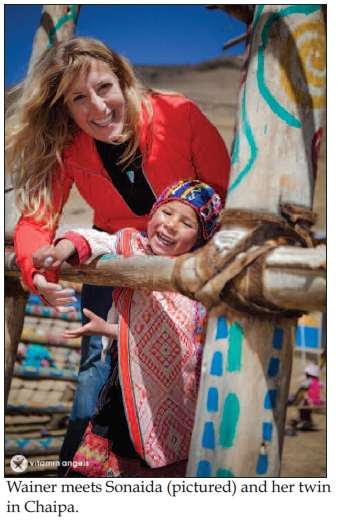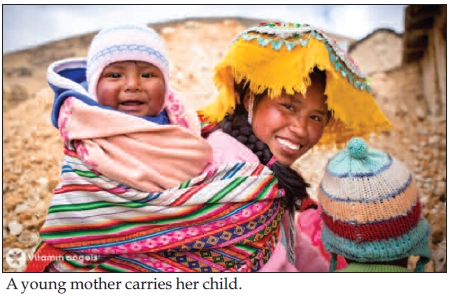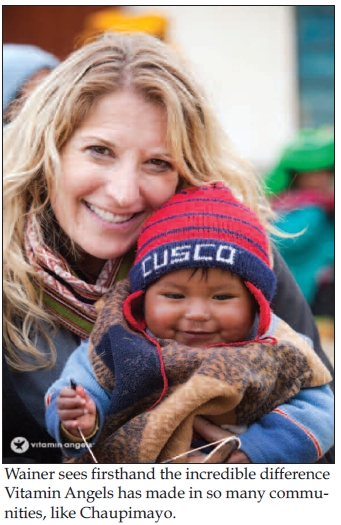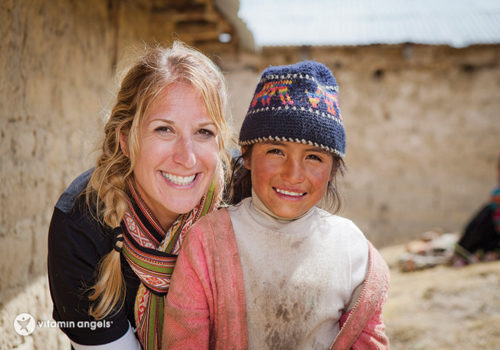A child’s smile is one of the most beautiful things on Earth. And that is exactly what we saw as we traveled 13,000 feet up in the Andes of Peru where non-profit organization, Vitamin Angels, was observing distribution of their prenatal and children’s multivitamins.
Children in these communities walk at least 45 minutes to school and, yes, it is not only up hill as our parents used to say, but up mountains. Their diets consist mostly of potatoes with very little protein or nutrients. Potato soup is the menu for breakfast, lunch and dinner with some meat, milk, cheese and eggs thrown in every once in a while, and even these are served very sparingly.
Yet, these children know no other life and are happy. They have wonderful mothers who nurture them and make do with what they have. It might mean they improvise games, like playing soccer with a plastic water bottle instead of a ball (it’s still fun!). Or, they are thrilled with the small treasures they do have, like a new jump rope from visitors like us. Perhaps most importantly, their parents are so grateful to know the children have more energy and are getting the vitamins and minerals their bodies need thanks to the children’s multivitamins and prenatal vitamins that Vitamin Angels provides.
When I saw these sweet children with their runny noses and  chafed, sunburned and wind-burned cheeks because of the altitude, all I wanted to do was wipe their noses, put cream on their cheeks, bathe them and dress them in clean clothes. But most of all, I wanted to love them. And love is what they received through Vitamin Angels, along with their vitamins.
chafed, sunburned and wind-burned cheeks because of the altitude, all I wanted to do was wipe their noses, put cream on their cheeks, bathe them and dress them in clean clothes. But most of all, I wanted to love them. And love is what they received through Vitamin Angels, along with their vitamins.
As I traveled with Vitamin Angels and our partner DESEA Peru observing the distribution of children’s multivitamins, I learned about Peruvian life high in the Andes. Most of the men work in agriculture or on the Inka Trail, so they are not home much. Most of the women have several children beginning at a young age, and they also work in the fields, care for and sell animals (if they are lucky) or weave. They appear to be very good, caring mothers, and are shy and sweet. The mothers trusted us to play with their children, admired a scarf I bought from a Qhali (health provider) in one of the communities, and even imitated me when I yelled “gotcha” in a game with a little boy. They are also very generous; even though they do not have a lot to spare, they still offered me their potatoes to eat.
Vitamin Angels’ field partner, DESEA Peru, build water filtration systems so communities can have clean water. They also provide health services and, by partnering with Vitamin Angels, can provide prenatal and children’s multivitamins. DESEA also helps communities elect their own qhalis, local women who are trained to provide and promote health within the community. These women are illiterate and they learn through pictures. This position gives these women so much self-esteem. One qhali, Juana, became the first female president of her community. Another mother, Tibursia, became a talented weaver and made us beautiful bracelets. She had lacked skill as a weaver, but becoming a qhali gave her the confidence to excel.
 The language spoken in the communities is quechua. We needed English and Spanish translators to communicate, but somehow we did. Through translators, I learned their beautiful way of saying “you’re welcome,” which translates to “makes my heart flutter.” This is just an example of how kind-hearted the people are, even given the adversity they face.
The language spoken in the communities is quechua. We needed English and Spanish translators to communicate, but somehow we did. Through translators, I learned their beautiful way of saying “you’re welcome,” which translates to “makes my heart flutter.” This is just an example of how kind-hearted the people are, even given the adversity they face.
Children, without proper nutrition, will have stunted growth by the time they are two. We saw many children who looked like they were three years old but really were six, or four instead of eight. This is one of the reasons why the vitamins are so important and why the mothers are so thankful and ask us to keep providing them. The mothers who started using the prenatals found that they were carrying to full term and their babies are healthy and strong. They say their children have so much energy and do not get sick nearly as much as the older children who did not get vitamins.
Mothers taking prenatals find they have more milk for  lactation. Some were afraid prenatals would make their babies too big and they would need C-sections, which is especially a problem since the hospital is too far for most women to travel to and sometimes they are not accepted. They soon learned that they would just have healthy and strong babies and are so thankful for the prenatals.
lactation. Some were afraid prenatals would make their babies too big and they would need C-sections, which is especially a problem since the hospital is too far for most women to travel to and sometimes they are not accepted. They soon learned that they would just have healthy and strong babies and are so thankful for the prenatals.
We met so many wonderful women with such amazing stories. Jacinda sees such a difference in her twins Rosemary and Sonaida compared with their older sibling Alfreda because of the prenatals she took and the children’s multis the younger girls take. Anastasia said the same thing of her youngest children Sylvia and Jenny compared to her three older children. Then there is Reina, whose son Reuben was born early after she fell. He weighed less than three pounds at birth and she could not nurse him because he would not keep the milk down. Hospitals would not help. Finally, after 15 days, the baby was seen by a doctor and he started on the multivitamins at a year and half. He is smaller than other children his age, but he walks to school and plays with as much energy as the others. Reina attributes this all to the vitamins. Of course, she still worries about him like all good mothers, but she knows that he will continue to receive his children’s multis and will hopefully grow up and be like the other children.
All of these mothers have high hopes that their children will leave the communities, become teachers, nurses, chauffeurs or professionals and have a better life than they do. The mothers believe this is possible because of the help they have received from DESEA and Vitamin Angels.
|
About Vitamin Angels Vitamin Angels helps at-risk populations in need—specifically pregnant women, new mothers and children under five—gain access to lifesaving and life-changing micronutrients. In 2013, Vitamin Angels is working to reach 30 million children in nearly 50 countries, including the United States, with the vital nutrients they need as a foundation for good health. To learn more, visit www.vitaminangels.org. |
Published in WholeFoods Magazine, October 2013










